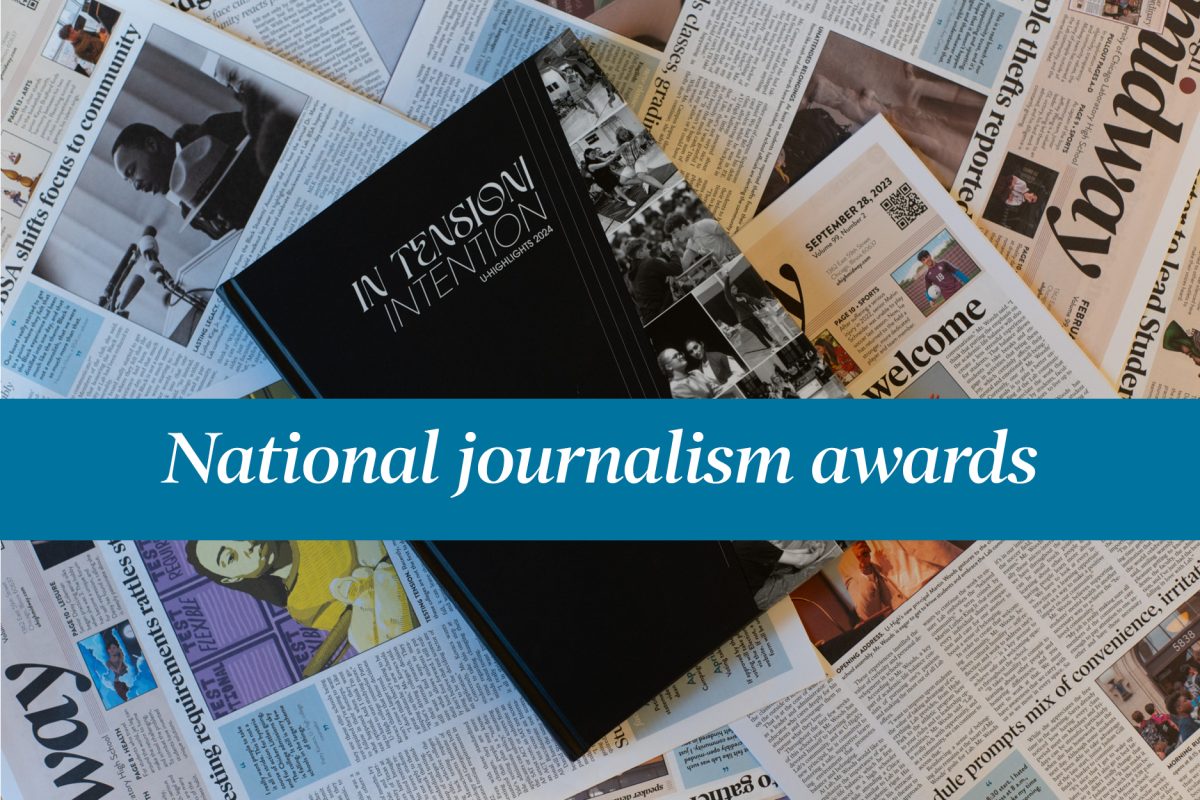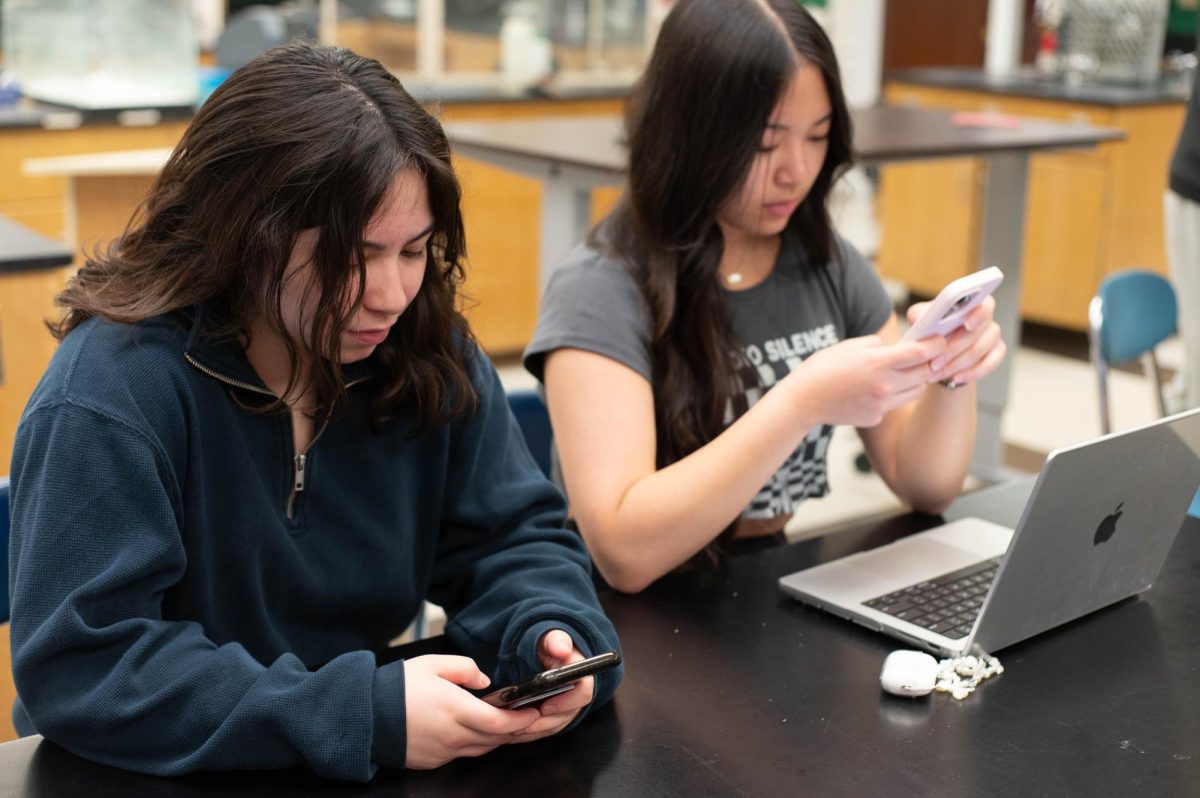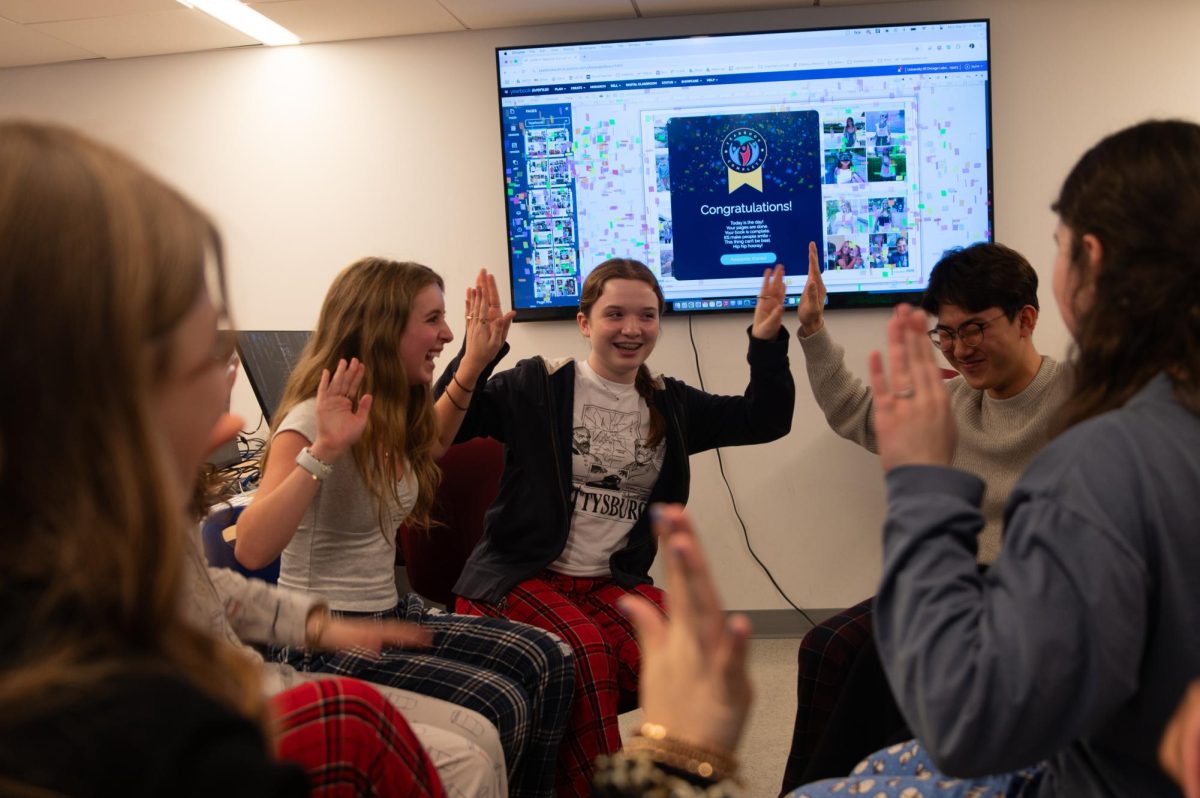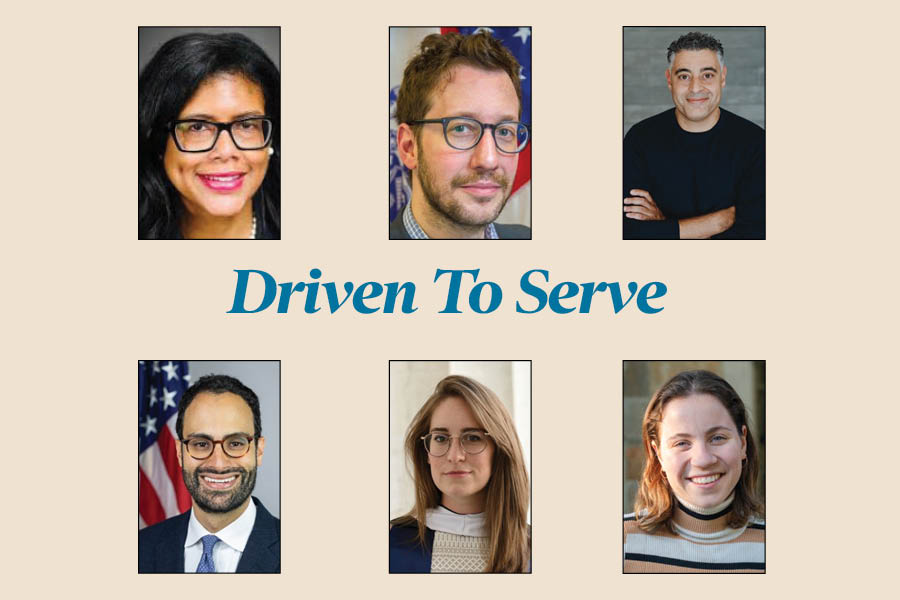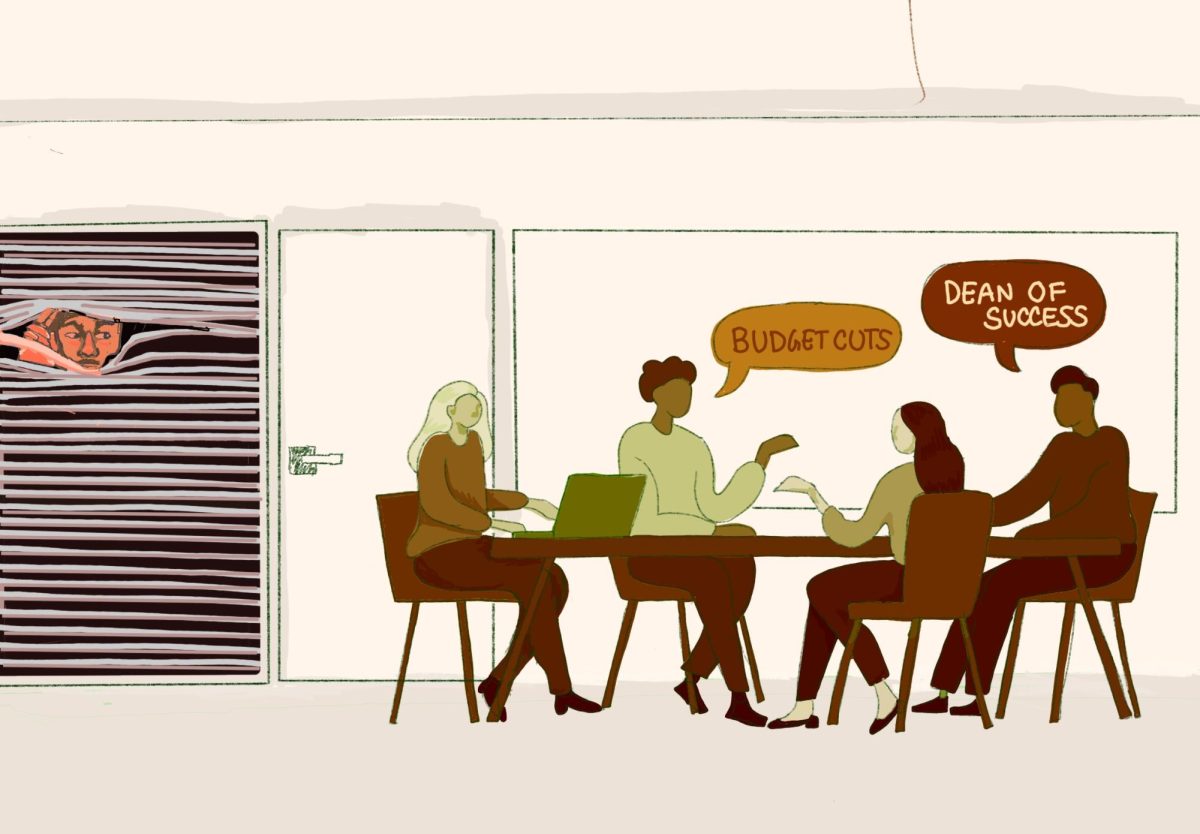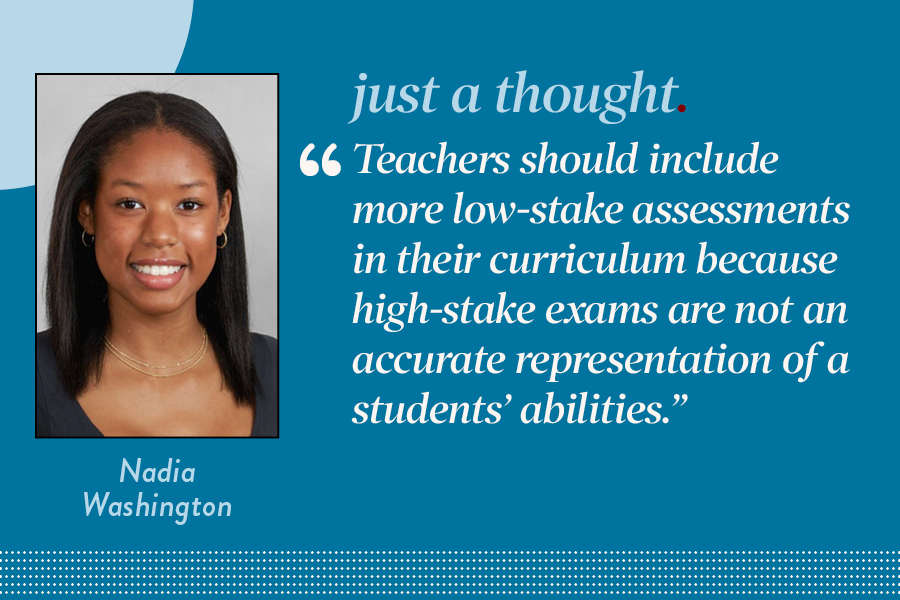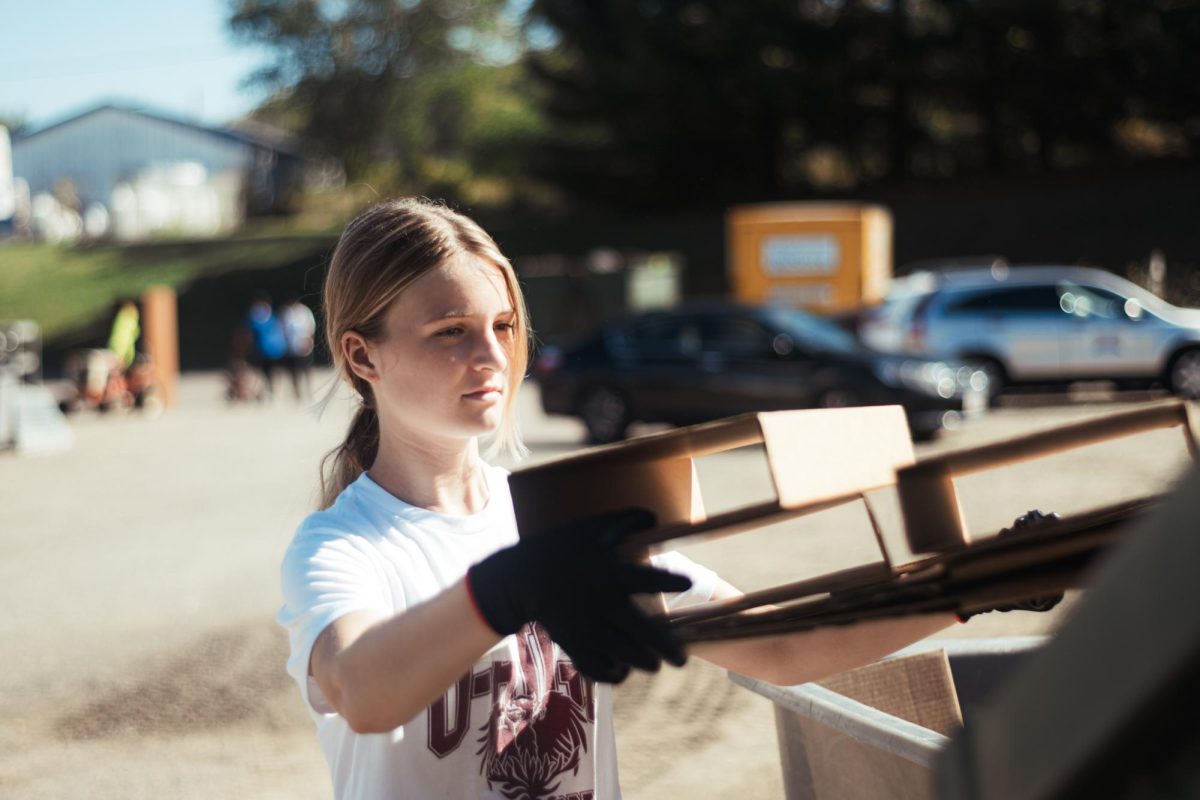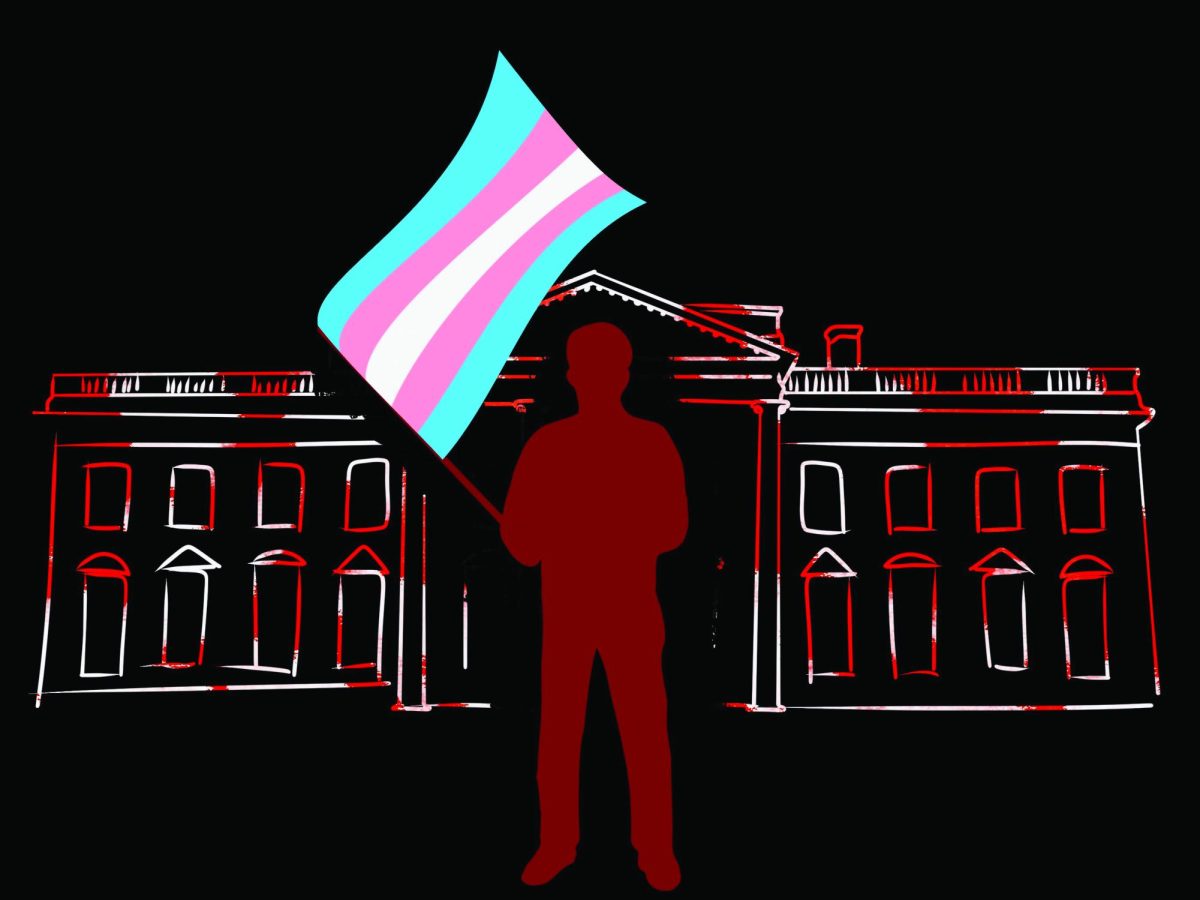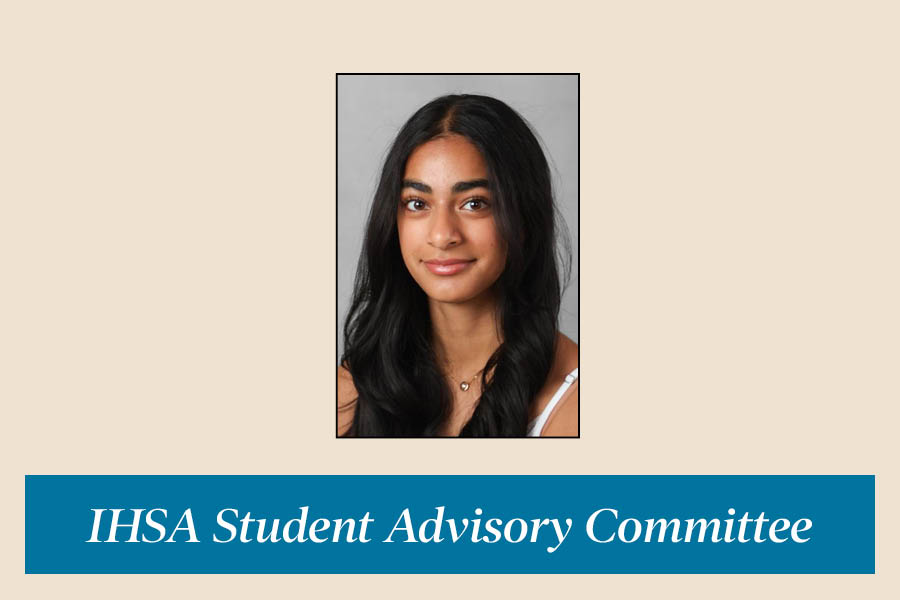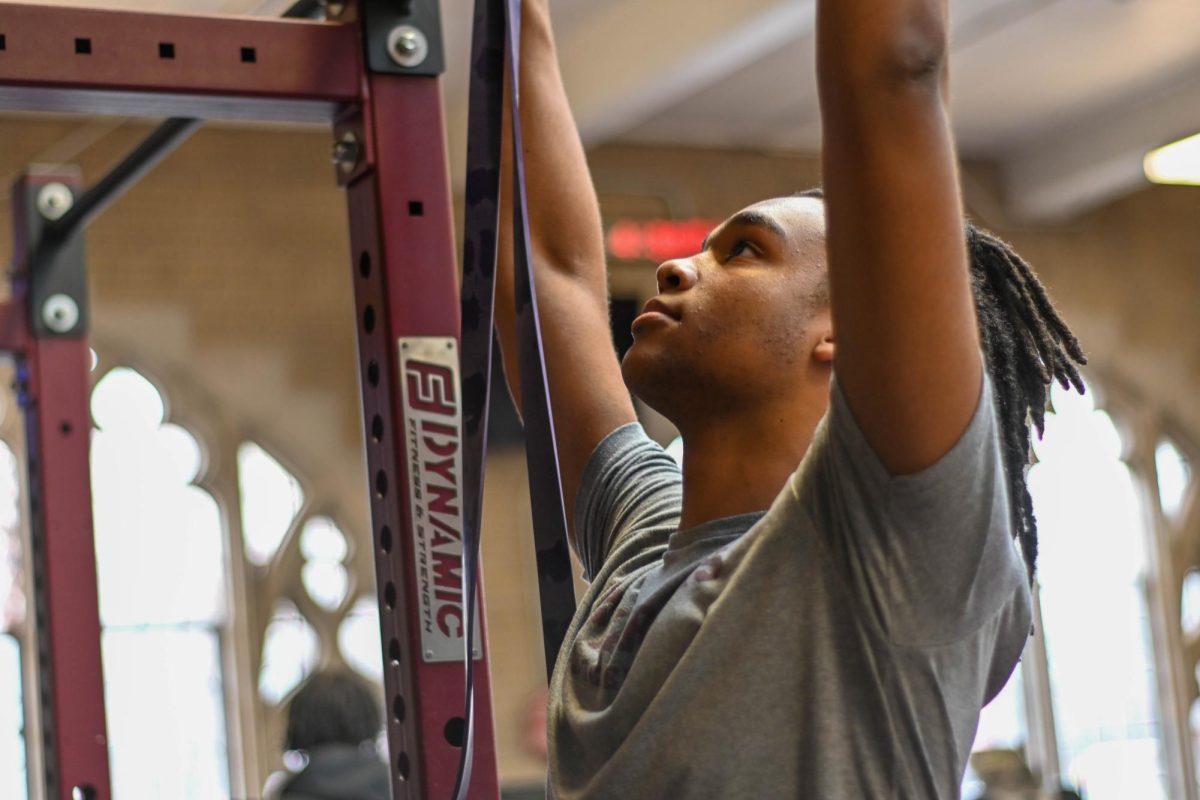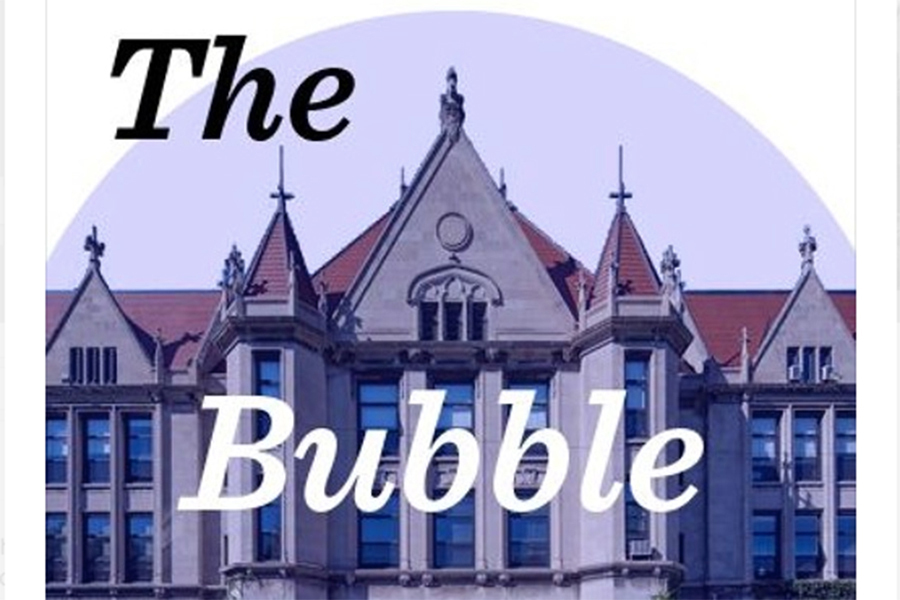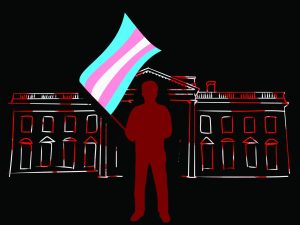The Bubble: Students on President Biden’s first month in office
March 12, 2021
In this episode of The Bubble, Editor-in-Chief Amanda Cassel and Managing Editor Berk Oto hosted a discussion between politically active U-High students on President Joe Biden’s actions over his first month in office. The panelists were sophomore Anika Gupta, junior Saul Arnow and senior Orla Malloy.
In this segment on President Biden’s early policies, our panelists discuss his transgender and racial non-discrimination actions.
In this segment on President Biden’s early policies, our panelists discuss his proposed stimulus plan.
In this segment on President Biden’s early policies, our panelists discuss his ideas around unity.
In this segment on President Biden’s early policies, our panelists discuss his ideas and actions around climate change.
In this segment on President Biden’s early policies, our panelists discuss his ideas and actions around foreign policy.
A full transcript of the discussion is below.
Saul: Uh, I’m Saul. I’m a junior and my pronouns are he, him.
Orla: Um, hi, I’m Orla Malloy. I’m a senior and my pronouns are she, her, hers.
Anika: So my name is Anika, um, and I am a sophomore and my pronouns are she, her.
Amanda: Fantastic. Okay, so we are just gonna get started. Um, so our first topic is racial and transgender non-discrimination. Um, in his first few days in office, president Biden signed four executive actions relating to racial non-discrimination and then, there was also one relating to LGBTQ plus non-discrimination. So the racial non-discrimination orders addressed inequity in the department of housing and urban development, um, private prison contracts, uh, tribal sovereignty and addressing heightened discrimination against Asian-Americans. And then, um, the LGBTQ+ nondiscrimination order expanded protections and built off the Bostock v. Clayton County Supreme Court case to protect transgender people from workplace discrimination. So our first question is what do you think the orders are lacking? And what other policies do you think President Biden should implement?
Orla: I think it’s, I mean, so far it seems like he’s doing a really great job and it seems like he’s very action-oriented. I feel like, I mean, it’s obviously, it’s definitely more than his predecessor that’s for sure. But at the same time, I feel like there could be, I mean, like, I didn’t even know half of the stuff that you mentioned. I didn’t even know that was a thing. Um, and from what I see on the news, it’s all I see is the rhetoric of just committing to all of these promises. Um, And all of these action plans. And I think something I would like to see more of is seeing that represented in the news cycle, um, of these very specific plants. Whereas just seeing, you know, speeches.
Saul: Yeah, I really agree with that, what Orla was saying about how, like, obviously these are really great first steps, but I think that it’s super, super crucial that like anti-racism and equity more generally are incorporated, like in all of his policy decisions that like, it’s not like he shouldn’t just have executive orders about, you know, anti-racism or whatever, but it needs to be included like, you know, when it comes to like, climate justice and like his housing policy and all of that, like, I think equity has to really be like front and center and it’s something that he’s publicly committed himself to, but I’d really like to see that in some of the actions he takes, you know, things were moving forward and, uh, you know, I’d like to see him commit himself to even more progressive policy when it comes to, uh, race and fighting LGBTQ discrimination, things like that. But yeah.
Anika: I think I definitely agree with that. I also read an article about the things that he had been doing in his first couple of days in office. And I found that a lot of the things that he passed for racial discrimination, he like denounced a lot of things. So like, what does that actually mean? Like what does denouncing anti-Asian discrimination? And Xenophobia like, what will that do? And what, what is, what does he, like? I just feel like denounce is too broad of a term because I feel like it’s not actual action. I think it’s a definite great first step, but I would like to see like, I guess, action with that.
Orla: Yeah. And kind of going off of that. It’s obviously a really great first step considering what has happened in the last year, our country has been turned on its head. Um, and it’s exposing what Black Americans, what Indigenous Americans, what Asian-Americans have known for decades for generations, for lifetimes. Um, and it’s a deep, deep-seated problem that has really deep roots in America. Um, And I don’t know how Biden is going to tackle that. I think, you know, denouncing is important, but I do think that there needs to be a lot more transparent and very obvious action just because it’s really crucial. Um, so yeah.
Berk: Saul, I know you mentioned wanting more progressive policies from Biden. Could you give some examples of progressive policies they could address, you know, anti-racism and trans discrimination?
Saul: Yeah, I think I’d really like it if he committed himself to, uh, like, like to reparations more generally, uh, when like, as an anti-racist policy, I’m not sure whether he came out for the, uh, uh, came out in support of the, uh, that, that bill in the house that’s for like granting a, uh, like a subcommittee to determine what reparations would look like. But if not, I’d really. I’d really support him coming out in favor of that. And I also think that there’s like, it’s not as if there’s like a shortage of ideas for incorporating anti-racism and discrimination laws, like into his, uh, into the policy she’s trying to pass. Like, I think one place he can look to is, uh, some of his, uh, like previous opponents in the primaries had really, really strong plans. Like people that are just Douglas plan was really pretty comprehensive, uh, as like a step towards racial justice. I think loads of his, uh, and, uh, Corey Booker’s baby bonds plan again, would be another really, really great anti-racist policy. And, uh, I think that he, he could look to places like that for policies he could support.
Amanda: Yeah. Those were all really good answers. I think we’re gonna move on to our next section. Um, Berk, do you want to talk about stimulus and, um, minimum wage?
Berk: Sure. Uh, the current stimulus plan proposed by the house is for about $1.9 trillion. And it includes raising the minimum wage to $15 benefits for parents with children under the age of 18. And the significant increase in funding to the education system among several other things. Where do you think the stimulus plan needs to direct most of its funds and why?
Orla: Well, I certainly think I know there was talk about this in Congress, but I think there really needs to be some sort of a relief in a COVID relief bill. Um, in the COVID pandemic, so many people have suffered, um, not just to lose losing their loved ones, but losing jobs. I mean, I was furloughed from my job, my part-time job. And so, and you know, everyone, I know, know someone who’s been affected by COVID in some way. Um, and so I think a stimulus check or, uh, raising the minimum wage. I think it should be included in a COVID relief bill, just because our economy is at one of its worst points right now.
Saul: Yeah, I agree with what, uh, Orla was saying. And I mean, like I’m not an economist, so I don’t know how well I can really speak to, you know, like the specific, uh, ways he should distribute, uh, the, the funding that he’d like, but board, I think one crucial thing that he should be really cognizant of is, uh, it is, you know, going big rather than small. I think that there’s really been a push from the right to like, you know, raise concerns about deficit spending or whatever, in a way that I think is pretty bad faith. And doesn’t really meet the scale of the moment. And I also think that the, the, I mean, the two places that he has to prioritize are like economic relief for working people who have, uh, you know, been furloughed or, uh, are struggling throughout the pandemic. You got a really, like, I appreciate $2,000 stimulus checks. I’m not super sure why he decided to go with the 1400 plus 600 to make it technically 2000, rather than just going straight up 2000. And, uh, but then also I think focusing on making sure that we, uh, like have a national test and trace strategy, which he’s done a good job of, uh, like beginning to construct and, uh, um, uh, vaccine distribution, all of that as well. So dealing with the pandemic directly and the economic fallout.
Anika: I think adding on to all of those, I think that. Um, we can see that in minority communities and less economically stable communities were harder hit by the pandemic and are, have been suffering much more than maybe the media accounts for, or maybe that we can see. So I think that’s the stimulus still and, um, like wage, um, advancements that he made that Biden makes. Could benefit them and target them more and give them more because of how much they’ve suffered because of their economic status, because of the communities that they live in.
Amanda: Um, so we talked about knowledge discrimination, action and equity a little bit earlier. How do you think we see those ideas of equity as Anika just brought up within the stimulus plan? So where are important places for the stimulus to support communities that need or that were particularly hard hit by the pandemic?
Saul: And is that, is that stuff that’s already in the plan that like, we, we like the supporting, uh, like, uh, like supporting equity or is it stuff that we want to see in the plan that would be supporting equity?
Amanda: Either works.
Orla: I think going to mean both Anika and Saul said it, there needs to be a lot more. I think, I mean, I think the best way to improve every single American’s life is intersectionality in all of Biden’s plans. Um, so I think, I mean, there’s no doubt BIPOC communities have been one of the worst-hit in the pandemic. Um, and so I think. That should definitely be a target for a stimulus check. Um, and we still see there being issues. I saw a map recently of the Chicagoland area and, uh, where vaccines have been distributed to and what an overwhelming amount of vaccines have been successfully distributed to like the University of Chicago area and the Northside. Um, So I’d like to see more attention to those communities that are predominantly nonwhite. Um, so yeah.
Saul: Yeah. I agree with what Orla was saying. I think that the federal government really has an important role to play in like, uh, setting out like concrete standards, not just, you know, saying that we, you know, we have a commitment to equity, but being specific about how that equity can be manifested in like the waste that vaccines have to be distributed, the way that tests are distributed, things like that. I think that that’s a super, super important. And I think it’s especially important, like coming off of the past administration that had like a sort of silly Federalist approach to, uh, dealing with things where it’s really on a state-by-state basis where I think the federal government can take the lead show, how specifically we can incorporate equity and also do just a generally good job dealing with COVID.
Amanda: So sort of along that idea of equity, um, and one of the themes in president Biden’s inaugural dress address was unity across America. So, um, particularly after the insurrection on January 6th, Um, do you guys think unity is possible? And if you do, what do you guys think unity looks like in America at this point?
Orla: Yeah. I mean, if there’s one word that I heard over and over and over again at the inauguration, it is a unity to the point where, you know, when you hear a word and you say a word so much, that it sounds like it’s not a word. It was like, I was hearing unity so much. Um, look, I mean, I don’t think, I mean, in this Bubble, haha, we can all agree that we want to see a united country. Um, and I thought that was something that we could all agree upon, but I was watching Trevor Noah, everyone should check him out. He’s great. He’s super hilarious. And he was talking about Biden’s commitment to unity and he was looking at some segments from Fox News and Trevor Nova’s hilarious, but like, the Fox News segments were so bizarre to me because, for Biden’s inauguration speech, they were specifically making fun of the fact that he wanted America to be united and they almost portrayed unity as an American value. So I don’t want to be pessimistic, but if we can’t even agree on being United, what hope is there for other issues? So I don’t know if anyone that’s a take on that.
Saul: Yeah, I agree. I mean, like, obviously this is a, it was a very big question, you know, that has a lot of, a lot of layers to it. I think we have to be really intentional about the way we like what we mean when we say unity. Cause I think that like, uh, unity without justice and like, you know, thoughtfulness isn’t really unity at all. I think that like, uh, the calls for unity after the insurrection coming from the right. Though we know how, like, after unifies, the country really runs hollow where like, it seems like what we should really do is unify around like shared values that are people who won elections. Like are the people who won the election and that’s that, you know like those are the things we should unify around. But, um, I don’t think that unity has to mean things like bipartisanship like bipartisanship is good, but. The Democrats have the governing mandate by like huge, huge majority’s like in, in, uh, in, you know, in the, in the Congress and in the executive branch. And so I think that, you know, it’s important to like, you know, hear the concerns with the right and see if there’s bipartisanship. But I don’t think that, that Joe would be giving up on unity if he, uh, if he pushes for, uh, for the policies that he has the governing majority to push for.
Anika: I think, definitely agree with that. Um, I also think that right now, um, or idea of unity is more, um, the people who. We’re a part of the instruction, like understanding our ideals, like, and Biden’s ideals. And I think that that’s why it’s so unrealistic to see that version of unity because I think that, um, in order for there to be unity, there has to be some sort of middle ground that’s reached. And like, personally, for me, it’s hard to see a middle ground, but I do believe that that’s the only way for there to be agreement is for each side to give and take a little bit, um, instead of just trying to, um, force the other side too, um, like change their ideals completely.
Berk: Specifically, what do you think that the greatest obstacles to unity are in the United States right now? And what are actions that you think that president Biden could take to try and advance his message beyond just, you know, speeches?
Orla: I think that. I don’t know. I’d like to hear what other people think, but I think that maybe one of the biggest obstacles to unity right now in America is Donald Trump. Because even though he’s no longer president, he got acquitted, he could still run. And there’s still a lot of people in Congress who pledged their allegiance to Trump. Um, Which already divides, you know, that legislative branch, um, that Saul was talking about. Um, so I think Donald Trump is definitely an obstacle to unity, even though he’s not in a position of power. Um, and I’m not sure what he can do to convince the country that, you know, unity is what we need right now, besides speeches. I think. Um, I think I really liked what Anika said about give and take, trying to, although, you know, we don’t agree on everything listening and seeing if there’s something that we can, uh, agree upon. So I liked that like give and take.
Saul: I read a, I read a really good book about this over the summer that I recommend to everyone. It’s by Ezra Klein called Why We’re Polarized. And I feel like he gives a really, really excellent answer about, uh, about like, you know, the history of polarization in America. And he talks about how, uh, like, like race is kind of the central actor, uh, through which like America has become polarized is basically like that. The battle between anti-racist legislation and not. And, uh, and I, I think that he gets really good answers. So I’d recommend that. I think that also like a lack of shared facts is really like, I feel like. I feel like it was a thing that loads of people have said that, but it’s really hard to unify around. Uh, you know, like, like, like, like simple things when, uh, like, uh, like who won an election or whatever, when not everyone agrees on facts that were agreed upon before. And I think that, uh, like Fox News and like social media more broadly, like the way the Facebook algorithm is set up, uh, contributes to this unity as well in the way that they, you know, like promote polarization and radicalization of people. I think that’s really, really concerning. I guess another way to, to make the nation a little bit more unified would be to make American institutions a little bit more democratic and a little bit more representative, like in the, like how unrepresentative of the popular, well, the Senate is, I think to me that that seems like a real obstacle to unity when, uh, when like, uh, like institutions like the Senate and the electoral college, like consistently overweight, white, rural, rural, and educated people.
Orla: Yeah, I definitely think that social media is also an obstacle. It doesn’t see. I mean, I don’t know what politics was like 50 years ago, but it doesn’t seem like there’s a lot of people who are in the middle who are centered. It seems like if you were to graph it, like, you know, a spectrum, it would look like this just because people have really strong opinions now on either side. And I don’t know very many people who are, you know, on the fence or are in the middle. Um, so maybe that could be a solution to unity is trying to. Distance ourselves from some of our very strong opinions.
Berk: I think one thing that, uh, President Biden has done at least a unify within his coalition has been in the diversity of his cabinet. President Biden has had the most diverse cabinet and senior staff in history with an all-female communication staff, senior communication staff, the first black defense secretary, the first female secretary of the treasury and the first Latino to lead the Department of Homeland security. Do you think that such a diverse candidate and cabinet? And senior staff will shape the policies and practices of Biden’s term in office. And if so, how do you think this will have an effect?
Anika: I really hope that it affects the way that policies are made. Um, I think that the best way to. Create policies that, um, are for specific groups of people is to have those people’s input. Um, and with those people in the government and in the white house, um, aiding Biden and all of his decisions, I think that that will allow for, um, policies to be made that are more. Um, specific and better, uh, better created for the communities that they’re supposed to be for. So I think that I hope that that is the result of having such a diverse, um, group of people in the government, in the white house with Biden.
Orla: Yeah, I think it’ll definitely echo into some of Biden’s action plans, being surrounded by the people who have, you know, being surrounded by a diverse, uh, array of people. And I also think to echo what. Uh, vice president Harris said in her victory speech, she’s the first, but she’s not the last. And it’s really important for young people to see so many diverse people in government so that it allows more people in the future to, uh, pursue those careers in those positions in government. Just because, you know, when you see someone that looks like you, you’re like, wow. So yeah, I think that’s another way that it’s really impactful.
Saul: Yeah, I really agree. And I think also, uh, I think one thing we forgot a lot of is just like the power of the cabinet secretary is really like, do hold like the power, the HHS secretary holds over Medicare and Medicaid rates and all of that. Like, I think it’s really, really great that these aren’t just like, uh, you know, symbolic positions that they’re holding. But they, but like cabinet positions oversee a lot of the day-to-day function and implementation of policies. And it’s really, really great that they’re the, you know, the diverse perspectives that Joe’s put together. Uh, we’ll be able to, uh, um, like adequately, uh, implement, uh, equity measures in the policies that they’re implementing on the day-to-day basis. But, uh, I mean, you know, I, I like a lot of the diversity in Joe’s cabinet, but I’m also like, not fully there. I think some like, uh, Tom Vilsack for agriculture secretary, he he’s someone who, I’m not a huge fan of doesn’t have a great record on animal rights and things like that. Like, I think that, well, it’s important obviously to have, uh, uh, like a diverse perspective in the cabinet. I think also the, the policy positions that they hold, they’re also super, super crucial.
Amanda: Yeah. Um, so moving on to climate, um, so in president Biden’s first day in office, he rejoined the Paris Climate Accords and in his first week he named climate to be a required factor to be evaluated when determining all governmental policies. Um, so what other steps do you hope Biden takes to address the climate crisis?
Orla: Well, I love this topic. Um, but I think, I mean, I think so far he’s done a really great job of making sure the climate crisis is a priority in this administration. And, you know, you saw rejoining the Paris climate agreement. Get a lot of. Attention on social media, but I think equally important is that he canceled the Keystone XL pipeline permit, which is huge. I think that should be getting so much more attention. The determination of those indigenous activists over the past four years is so nuts. Um, but I think one of the next big steps for Biden will be. Declaring climate change and national emergency. We are one of the few countries who still has not done. So it’s supposed to be one of the first steps we have not done. So European parliament has done it, Canada, South Korea, New Zealand, the list goes on. Um, and so I really think we need to declare climate change in national emergency. I don’t think, I mean, you know, at lab, I think we all recognize that it’s an issue. But I think just having that declaration will really set the tone for this administration.
Saul: Yeah, I really, I really agree with everything that Orla said, just there about some of the great first steps he was taken. I think that, I guess two things that I’d really like to see are number one, I think a real willingness to act for executive action because it doesn’t seem like there’s a real serious way to get anything else done. I think that he, he can’t be afraid of, uh, you know, uh, of editorials, like from the New York times editorial board a couple of weeks ago that are like don’t overreach with, uh, executive action. Like I think the climate crisis is just such a crisis that he can’t afford to do anything else. And, uh, I think similarly, I think that the best climate policy that Joe Biden could do, would be to, would be to convince Joe Manchin and Kristen Sinema to get rid of the filibuster. Because without that, just like no big policies can get passed. And there is a governing majority for comprehensive, serious, uh, climate action. And there, you know, there’s like popular support for that. But I think that we’ve got to break some of the, some of the, you know, hate to say it, use this phrase for the gridlock in Washington to a push for real, a climate action to take place.
Anika: I think that for me, and I don’t know as much about climate change as I would like to. Um, but I think that it’s really important that I, um, I read that he, uh, wanted to, like, he like made an executive order to combat climate change by like using this by America thing. Um, by American I by America idea and that like suspended new oil, um, leases on public land. And like, there are a bunch of specific things that he can do, but I would also like to know like, What can the general public do for climate? And like, I feel like that’s something that our president can like tell like the general public and also like, um, uh, Orla was saying. Like declaring it as a national, like emergency we’ll tell everybody in the country that it’s like an actual issue. Cause I mean, it’s hard for me to believe that there are still people in our country who don’t even believe that it’s an issue or don’t even believe that it exists. So I feel like nothing can really change unless the people begin to realize, okay,
Berk: Another issue that affects the entire world is foreign policy. President Biden Biden has made it clear promise of his campaign to strengthen our alliances and maintain the current world order against aggressive revisionist States, such as China and Russia. Do you think Biden will be successful in preserving us global per supremacy and holding these countries accountable for their human rights action? abuses and actions.
Anika: I hate the idea of global supremacy. I understand that it’s something that America has felt very strong about and how, um, in the past we’ve wanted to be the global superpower of global hegemony, all of that, and like, We thought threatened one countries like China seem to have more power than us, like, um, but I think that Joe Biden should definitely focus on strengthening foreign policies instead of just saying that America is powerful and that’s why other countries should, um, like be in good communication with us. I feel like that’s not a good stance when it comes to foreign policy. I think that it should be more of like an Alliance rather than, um, a sense of power hierarchies.
Orla: I totally agree. Um, the last four years, the Trump administration has prioritized isolationism and we’ve essentially isolated ourselves from the global community. Um, And, you know, I mean, his slogan was make America great. Again, our entire administration was centered around America, um, and it was hard to focus on what was happening in the rest of the world because so much was happening here and so much was centered on America. And I think like Anika said, I think the next four years with Biden need to be focused on allies on collaboration. Um, working together and, um, including ourselves in the global agenda, rather than trying to be a superpower or be the best or be great. Okay.
Saul: Yeah, I totally agree with everything that, uh, the Orla and Anika were saying about how, uh, how ha how, uh, I don’t think it’s, uh, like it’s super realistic or, or, or the right idea to think about pushing for us globally, Germany, like in the kind of multipolar world we live in today. But I think one thing that. That makes me hopeful is a, is Joe Biden, like he talked about a lot about on the campaign trail about having, like, talk to all of these world leaders on the phone or whatever, when he was vice-president. And that is something that is super, super crucial. I think like, cause, his foreign policy is really based around his like personal or the way he does foreign policy is based around the personal relationships he has with leaders, which I do think is going to be so, so crucial in like kind of. Help, uh, helping save America’s rubber, uh, reputation internationally and bringing our global allies a lot closer. And I think to the question about, uh, uh, about China and Russia, I think that we have to be careful, obviously not like I think that, you know, us. Us foreign policy has been very much global police, many for a long time in a way that hasn’t been super effective, but of course, there are legitimate like intellectual property concerns and human rights, abuse concerns for Russia and China. And for that, I think bringing her allies together and acting on a unified front was really, really great.
Orla: Yeah. The question of China, I think, is really complicated just because recently, you know, there. Americans have realized that there are, uh, the Uighur Muslim camps. And, um, I, I, most Americans, I, I hope are not okay with what’s going on there. So I think it’ll be really hard to, and also with what happened to Navalny in the past two months, it will be hard to focus on collaboration when there are these really pressing issues that, uh, Americans disagree with on with those two countries.


